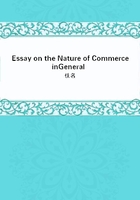
第44章
Nevertheless a money lender will prefer to lend 1000 ounces of silver to a hatmaker at 20 per cent interest rather than to lend 1000 ounces to 1000 water carriers at 500 per cent interest.
The water carriers will quickly spend on their maintenance not only the money they gain by their daily labour but all that which is lent to them. These capitals lent to them are small compared with what they need for their maintenance: whether they be much or little employed they can easily spend all they earn. Therefore it is hardly possible to arrive at the profits of these little undertakers. It might well be that a water carrier gains 5000 per cent of the value of the buckets which serve as his capital, even 10,000 per cent if by hard work he gains 100 ounces of silver a year. But as he may spend on his living 100 ounces just as well as 50, it is only by knowing what he devotes to his upkeep that we can find how much he has of clear profit.
The subsistence and upkeep of Undertakers must always be deducted before arriving at their profit. We have done this in the example of the farmer and of the hatmaker, but it can hardly be determined in the case of the petty Undertakers, who are for the most part insolvent when they are in debt.
It is customary for the London brewers to lend a few barrels of beer to the keepers of ale-houses, and when these pay for the first barrels to continue to lend them more. If these ale-houses do a brisk business the brewers sometimes make a profit of 500 per cent per annum; and I have heard that the big brewers grow rich when no more than half the ale-houses go bankrupt upon them in the course of the year.
All the merchants in a state are in the habit of lending merchandise or produce for a time to retailers, and proportion the rate of their profit or interest to that of their risk. This risk is always great because of the high proportion of the borrower's upkeep to the loan. For if the borrower or retailer have not a quick turnover in small business he will quickly go to ruin and will spend all he has borrowed on his own subsistence and will therefore be forced into bankruptcy.
The fishwives, who buy fish at Billingsgate in London to sell again in the other quarters of the City, generally pay under a contract made by an expert scrivener, one shilling per guinea, or twenty-one shillings, interest per week, which amounts to 260 per cent per annum. The market-women at Paris, whose business is smaller, pay 5 sols for the week's interest on an ecu of 3 livres, which exceeds 430 per cent per annum. And yet there are few lenders who make a fortune from such high interest.
These high rates of interest are not only permitted but are in a way useful and necessary in a state. Those who buy fish in the streets pay these high interest charges in the increased price. It suits them and they do not feel it. In like manner an artisan who drinks a pot of beer and pays for it a price which enables the brewer to get his 500 per cent profit, is satisfied with this convenience and does not feel the loss in so small a detail.